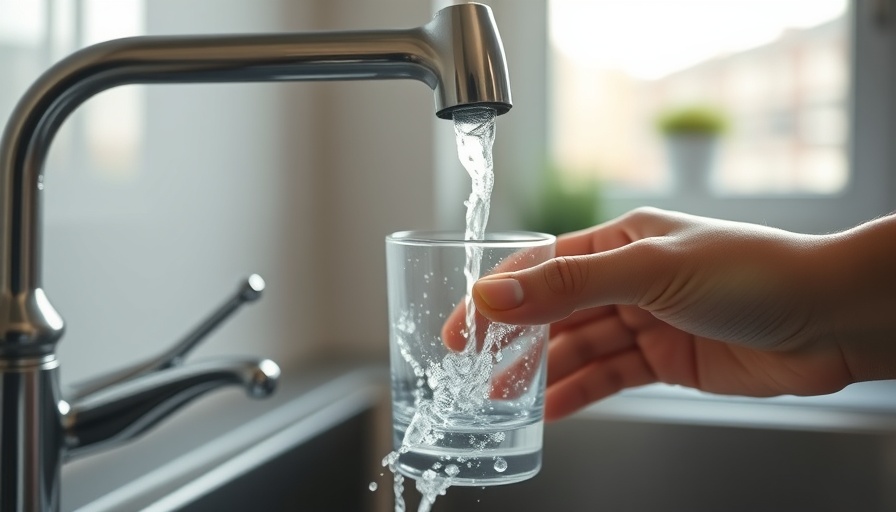
PFAS Contamination: A Growing Concern for Hospitality Professionals
The recent report from the Natural Resources Defense Council (NRDC) has shed a glaring light on a concerning issue facing millions across the United States: elevated levels of per- and polyfluoroalkyl substances, commonly referred to as PFAS, in tap water. With more than 73 million people exposed to these toxic chemicals, the implications are profound, especially for boutique hospitality professionals dedicated to providing safe and sustainable lodging environments.
Understanding PFAS: What Are They?
PFAS, often termed "forever chemicals," are synthetic substances that do not break down easily in the environment. They are commonly found in a wide range of everyday products, including food packaging, non-stick cookware, and even cleaning products. The recent NRDC report highlights that in many congressional districts, drinking water exceeds the safety thresholds set by the U.S. Environmental Protection Agency (EPA). The health risks associated with long-term exposure to PFAS are alarming, encompassing potential reproductive harm and increased risks of certain cancers, making it crucial for stakeholders in the hospitality industry to be aware of these contaminants.
High PFAS Levels Found Nationwide
According to the NRDC, the contamination of drinking water with PFAS is not confined to a single region; it spans nearly every state, with Arkansas, Hawaii, and North Dakota being the exceptions. Even Washington, D.C. and various U.S. territories are affected. Given that approximately 79% of congressional districts report unsafe PFAS levels, this poses a significant challenge to hospitality businesses who prioritize eco-conscious practices and customer health.
Implications for Hospitality Sector
For boutique hotel owners and eco-lodge operators, the implications of PFAS contamination extend beyond compliance with health standards. Today's consumers are increasingly concerned about the quality of the water they consume. From the glass of water served at check-in to the meals prepared with tap water, the presence of PFAS could deter environmentally-aware guests. Moreover, with the EPA planning to rollback certain health standards for PFAS, the risk of contamination may only exacerbate, leading to further public health concerns and potentially lost business.
Taking Action: Ensuring Water Safety in Your Establishment
In light of these findings, boutique hospitality professionals should assess their water sources critically. Implementing robust water filtration systems can reduce PFAS exposure, ensuring guest safety and compliance with health regulations. Furthermore, educating staff and guests on potential water quality issues—through informational brochures or workshops—can foster a more responsible and eco-conscious environment.
Future Trends and Opportunities in Eco-Conscious Hospitality
As the awareness surrounding environmental issues grows, many hospitality businesses have started to embrace sustainable practices that help combat other pressing problems, such as microplastics and climate change. Incorporating elements like chaos gardening in landscaping or utilizing eco-friendly amenities can significantly enhance guest experiences while promoting responsible tourism. By aligning their core values with those of their clientele, hospitality professionals create long-lasting relationships and uphold their brand integrity amid growing environmental concerns.
Cultural Resonance: The Importance of Water Safety
Water is an essential element linking all lifeforms on Earth, serving as the foundation of health and wellness. This makes the conversation on water quality especially relevant to the hospitality industry. Building nature reserves or promoting local artisan water brands can bolster community contributions while offering guests unique experiences that resonate with their values. When guests feel connected to the local environment, they are more likely to return.
As the NRDC warns, the crisis surrounding PFAS levels in tap water signifies an urgent need for action. With the hospitality sector being a pivotal part of many communities, professionals must adapt and advocate for safer water alternatives within their establishments and the broader community.
In conclusion, as the report reveals a concerning trend regarding drinking water safety, it is imperative for boutique hospitality professionals to take proactive steps to ensure the well-being of their guests while fostering a deeper commitment to sustainability. The time to act is now, not just for the future of the hospitality sector, but for the health of all who rely on clean, safe drinking water.
 Add Row
Add Row  Add
Add 




Write A Comment